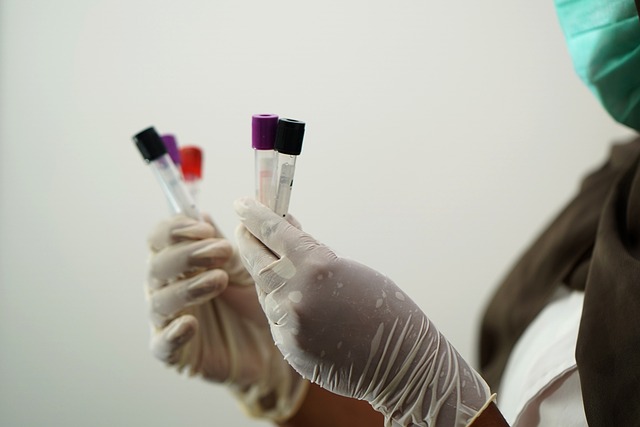A full body blood test, also known as a comprehensive metabolic panel (CMP), is a powerful tool for early detection of health issues by analyzing key biomarkers in your blood, covering kidney and liver function, electrolyte balance, glucose levels, and more. It can reveal conditions like dehydration, anemia, inflammation, or serious problems such as kidney disease, diabetes, or thyroid disorders. Regular testing is vital for preventive care, especially during life stages like planning a pregnancy or managing chronic conditions, offering insights into overall well-being through parameters like CBC, lipid profiles, electrolyte balance checks, liver and kidney function tests, hormone assessments, and more. Accurately interpreting results requires understanding key markers like hemoglobin (Hb), ferritin, cholesterol levels, triglycerides, and CRP; discussing these with a healthcare provider enables proactive wellness management based on comprehensive health data.
“Uncover the secrets of your overall health with a trusted full body blood test—a comprehensive review essential for proactive wellness. This article guides you through the process, from understanding what these tests reveal about your body’s functioning to interpreting lab reports and taking action on the results. Learn when to consider this powerful tool, explore its key components, and discover how it can transform your health journey.”
- Understanding Full Body Blood Tests: What They Reveal
- When to Consider Getting a Comprehensive Blood Panel
- The Components of a Trusted Full Body Blood Test
- Interpreting Your Results: Decoding the Lab Reports
- Next Steps After Receiving Your Full Body Blood Test Results
Understanding Full Body Blood Tests: What They Reveal
A full body blood test, also known as a comprehensive metabolic panel (CMP), is an essential tool for evaluating overall health and detecting potential underlying issues. This single test provides a vast amount of information about your body’s systems, offering insights into everything from kidney and liver function to electrolyte balance and glucose levels.
By analyzing various biomarkers in your blood, full body blood tests can reveal a range of conditions. For instance, they can detect dehydration, anemia, inflammation, or even more serious health problems like kidney disease, diabetes, or thyroid disorders. These tests are valuable for both preventive care and diagnosing existing conditions, making them a comprehensive first step in understanding and optimizing your overall well-being.
When to Consider Getting a Comprehensive Blood Panel
Knowing when to get a comprehensive full body blood test is an essential part of maintaining optimal health. While routine check-ups with your doctor are crucial, a full panel blood test offers a deeper look at your overall well-being. Consider getting one as a preventive measure if you’re experiencing unusual fatigue, unexplained weight changes, or recurring infections. These symptoms could indicate underlying issues that a comprehensive blood panel can help uncover.
Additionally, certain life stages and health conditions warrant a closer examination. For instance, individuals planning to conceive may benefit from a full body blood test to assess their fertility and rule out potential deficiencies. Similarly, people managing chronic diseases like diabetes or high cholesterol should have regular panels to monitor their conditions effectively.
The Components of a Trusted Full Body Blood Test
A trusted full body blood test is a comprehensive evaluation that delves into various aspects of your overall health by examining multiple markers in your bloodstream. These tests typically include a wide range of parameters, offering a detailed symphony of insights into your physical well-being. From assessing vital nutrient levels and organ function to tracking potential risk factors for chronic conditions, every component contributes to a holistic picture of your current health status.
The components themselves can vary depending on the specific test panel chosen, but common markers include complete blood count (CBC) to analyze red and white blood cells, platelets, and more; lipid profiles to measure cholesterol levels; electrolyte balance checks; liver and kidney function tests; and hormone assessments. Advanced panels might even include markers for inflammation, autoimmune conditions, or nutritional deficiencies, providing a robust toolkit for healthcare professionals to detect and address potential health concerns early on.
Interpreting Your Results: Decoding the Lab Reports
Interpreting your full body blood test results is a crucial step in understanding your overall health. Lab reports can seem complex, but they provide valuable insights into various bodily functions and systems. Each result, from red blood cell count to cholesterol levels, offers a piece of the puzzle. It’s essential to discuss these findings with a healthcare professional who can help you navigate and decode the information.
Focus on key markers such as hemoglobin (Hb) for anemia or ferritin for iron deficiency. Cholesterol profiles show LDL (bad) and HDL (good) levels, while triglycerides indicate fat in your blood. Inflammation markers like CRP (C-Reactive Protein) can signal underlying issues. By understanding these results, you gain a comprehensive view of your health status, enabling proactive steps towards well-being.
Next Steps After Receiving Your Full Body Blood Test Results
After receiving your full body blood test results, the next step is to interpret them accurately. Begin by familiarizing yourself with the key markers and what they signify; this knowledge will help you understand your overall health status. Compare your results against established normal ranges provided by reputable sources or your healthcare provider for a comprehensive evaluation.
Next, schedule a follow-up meeting with your healthcare professional to discuss the findings in detail. They can offer personalized advice based on your unique profile and guide you on any necessary lifestyle adjustments or further testing. Remember, proactive health management is key; use these insights as a foundation to make informed decisions for enhancing and maintaining your well-being.
A full body blood test is a comprehensive health review that provides valuable insights into your overall well-being. By understanding the various components and interpreting the results, you can take proactive steps towards maintaining or improving your health. Whether you’re experiencing symptoms or simply seeking preventive care, this test offers a holistic view of your body’s function, enabling you to make informed decisions about your wellness journey.
